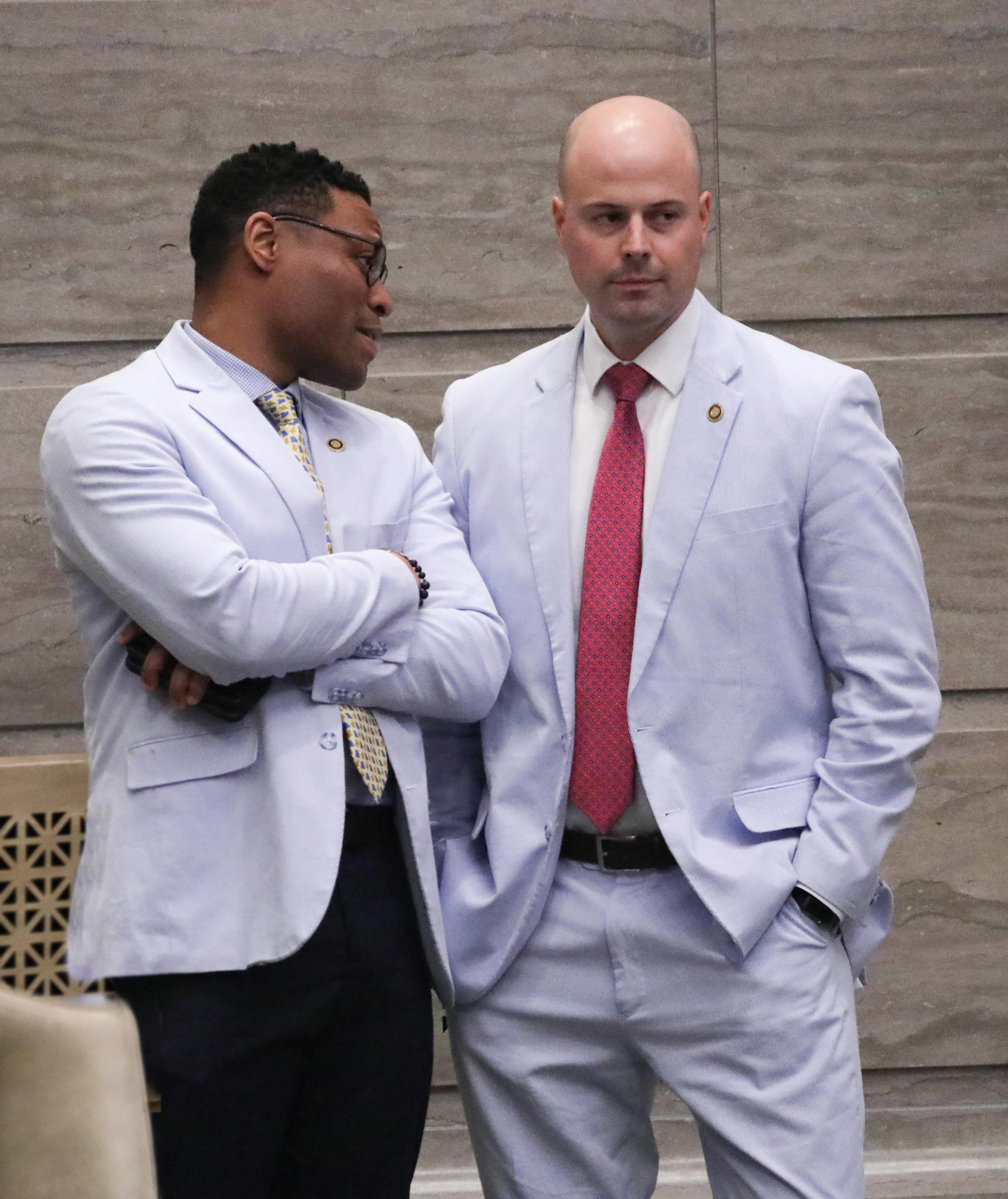JEFFERSON CITY, Mo. — It came down to the wire, but Sens. Tony Luetkemeyer and Brian Williams were able to get their large bipartisan criminal justice and police reform package across the finish line. And they did it without adding a controversial House provision that had caused the governor to publicly threaten to veto the whole thing.
SBs 53 & 60 were truly a labor of love for the senators this session and an opportunity for the pair to truly show their leadership and negotiating skills. It broadens the residency requirement for Kansas City police offers to within 60 miles of the nearest city limit and bans chokeholds. But the bill also contains a myriad of other critical provisions, including opening certain eligibility for expungement, providing free feminine hygiene products to inmates, and raising sheriffs’ salaries.
The package also establishes a stress management program for officers who might need help coping with trauma, requires the statewide coordinator for the sexual assault examination telehealth network to regularly consult with clinicians and others regarding training programs, and modifies the definition of “stalking” to include third-party sources such as technology.
It waives the fees associated with a veterans treatment court for someone who was honorably discharged from any military branch, protects the address of special victims, and ups the charges for doxxing a law enforcement officer to a Class E felony.
The bill also includes changes made to orders of protection — a topic largely discussed this legislative session. It adds pets to adult and children protection orders and allows a court to issue lifetime orders of protection in certain cases.
Additionally, the bipartisan package gives a prosecuting or circuit attorney the ability to file a motion to vacate or set aside a judgment if information arises to suggest an individual was wrongly convicted. It allows someone to file for an expungement after three years — down from seven years — for a felony offense and one year — down from three years — for a misdemeanor. If a person’s record has been expunged, any rights that had been stripped from the individual shall be restored, the bill said.
The legislation also establishes only an affirmative defense would be needed if a law enforcement officer failed to execute a warrant for a misdemeanor traffic violation. It also establishes a Class A misdemeanor offense for someone who directs a laser pointer at a first responder or other uniformed safety officers.
It also tackles juvenile cases. It establishes individuals who are under the age of 18 can remain in juvenile detention pending final judgment and completion of an appeal even if that person is standing trial as an adult. It prohibits holding a juvenile in adult jail for more than 180 days unless a court deems it necessary. And it instructs minors to be moved to a juvenile detention facility if they had been certified before Aug. 28, 2021, unless it’s established the person should stay in the adult facility through a hearing. Juveniles in adult jails are also supposed to be apart from adult inmates, the legislation said.
After some hiccups earlier in the week, the legislation made it out of a conference committee Wednesday with every member signing it. Members removed a controversial provision from the House that would grant the General Assembly subpoena power — a piece the governor publicly threatened would derail the entire bill. Luetkemeyer said they’ve worked closely with the Governor’s Office to ensure other priorities were included in the bill.
“To think now we have a comprehensive, strong bill that’s going to really focus on important issues that we’ve seen — the issue that happened in Minneapolis, we’re addressing that in Missouri. We’re making sure law enforcement has the best tools possible to be successful and also to maintain high accountability,” Williams said.
Both lawmakers spent significant time discussing and dealing with House and Senate leadership to get the bill through. And after its passage, the pair garnered praise from colleagues on both sides of the aisle.
“So grateful to Senators [Williams] and [Luetkemeyer] for their yeoman’s work on passing this bill,” GOP Rep. Shamed Dogan, who chairs the Special Committee on Criminal Justice, said on social media. “It’s been an honor and a pleasure to work with them on getting this done.”
“This was a big win for folks from across the political spectrum this year! Kudos to [Luetkemeyer] and [Williams] on a job well done,” said Senate Majority Floor Leader Caleb Rowden.
“This is a huge win for criminal justice reform for the state of Missouri,” Democratic Rep. Rasheen Aldridge said.

Kaitlyn Schallhorn was the editor in chief of The Missouri Times from 2020-2022. She joined the newspaper in early 2019 after working as a reporter for Fox News in New York City.
Throughout her career, Kaitlyn has covered political campaigns across the U.S., including the 2016 presidential election, and humanitarian aid efforts in Africa and the Middle East.
She is a native of Missouri who studied journalism at Winthrop University in South Carolina. She is also an alumna of the National Journalism Center in Washington, D.C.
Contact Kaitlyn at kaitlyn@themissouritimes.com.




































